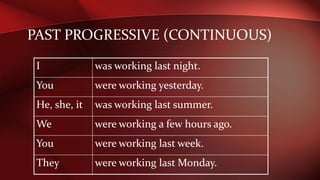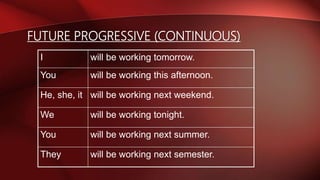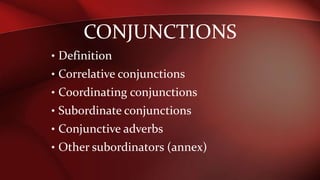For middle school
- 2. YES, I CAN • LEARN & SPEAK • ENGLISH
- 3. HOW TO LEARN ENGLISH EFFECTIVELY • SITTING AT A TABLE LOOKING AT YOUR NOTEBOOK IS NOT THE BEST WAY TO STUDY ENGLISH. MOST OF THE TIME, YOUR MIND IS NOT ACTIVELY USING THE INFORMATION THAT YOU ARE STUDYING, AND PRACTICAL LEARNING DOES NOT TAKE PLACE. HERE ARE SOME TECHNIQUES THAT WILL HELP YOU LEARN MORE EFFECTIVELY.
- 4. WRITE A JOURNAL Writing every day lets you see your grammar clearly in front of you, express your ideas, and use a non-oral method in communicate in English. Then read the corrected version out loud. It is a good idea to re-copy the corrected journal too, so that you will have the experience of writing your ideas down in proper English.
- 5. READ A BOOK • By Reading A Story, You Create A Picture In Your Imagination That Will Connected Different Parts Of Your Brain To English. Find A Book That Is Not Too Difficult. • Do Not Stop Every Time You Find A New Word. • Guess What The Word Probably Means, Continue Reading, And Check In Your Dictionary At The End Of The Page Or Chapter.
- 6. RE-WRITE YOUR CLASS NOTES EVERY DAY. • Writing your notes a second time will allow you to remember more strongly what you study. • It will also make your notebook neater, making it easier to study.
- 7. • Even if you don’t understand everything, you will still be learning. • It is possible to understand the content even if you know only 30% of the words that you hear! • Your listening ability will improve day by day-and it’s fun! WATCH TV AND MOVIES, AND LISTEN TO THE RADIO.
- 8. • Take an active approach to learning new vocabulary. • If you find 5 words a day, 6 days a week, you will learn about 140 new words a month; 10 words a day would bring you over than 280 new words a month. • Hint – approach new words by subject: things connected to your hobies, to your interests etc. • Do it this way: • Think of a word you know in your language. • Look it up in your dictionary. • When you find the English word, write it down on the left side of your vocabulary note book. KEEP A VOCABULARY NOTEBOOK IN A SEPARATE NOTEBOOK FROM YOUR CLASS NOTES
- 9. • In the midle of the page, write down if the word is a noun (n), verb (v), adjective (adj), etc. so that you will know how to use the word. • Look the word up in an English-English dictionary. • Write the English definition on the right side of the the page (or on the next page). • Copy a sentence from the dictionary. This will help you learn how to use the word correctly. • Practice reading this sentence untll it becomes natural for you.
- 10. • You improve your spoken English by speaking English in different situations with people of all nationalities. • If you want to speak English better in the future, speak it as much as possible now! SPEAK LOTS OF ENGLISH WITH YOUR FRINDS
- 11. • People who say “I can’t speak English well” are corrected. • People who say “Every day in every way, my English is getting better and better” are also correct. • What you think is what you get. • Practice saying the second sentence every day, and you will see greater improvement in your English and in your confidence. • Remember: the more fun you have with English,the easier it will be to learn ENJOY THINK POSITIVELY
- 12. PREVIEW • Definitions • Nouns • Pronouns • Verbs • Adjectives • Adverbs • Prepositions • Conjunctions • Interjections • Determiners • Subordinators • Interrogatives • Qualifiers • Sentence combinations • Yes/no questions • Information questions • Punctuation rules • Capitalization rules
- 13. GRAMMAR • DEFINITION The grammar of a language is a complex of systems that may be analyzed and studied on these three levels: (Noam Chomsky’s UG) 1. Phonology (set of sounds/ symbols) 2. Morphology (combinations of sounds that carry single units of meaning) 3. Syntax (how single units of meaning are combined to form words, phrases and sentences.
- 14. PARTS OF SPEECH (NOUNS) • Nouns 1. Definition 2. Proper / common 3. Singular / plural (annex) 4. Count / non-count /abstract (annex) (how much –how many) 5. Collectible (group nouns) 6. Units of measurement
- 15. DEFINITION (PROPER AND COMMON NOUNS) • Nouns – words used to name a person, place, thing, object, quality, idea, concept, or an action. • Proper Nouns- special or particular name given to common nouns to distinguish them from others of the same kind. Example: common- woman proper Martha a country China a pet Puppy many others a monument The Statue of Liberty a day Monday a place Ryder Hospital A person Carlos Proper Nouns
- 16. PROPER AND COMMON NOUNS COMMON PROPER COMMON PROPER day Saturday associations Members Club month October movies Titanic mountain El 眉山 planets Neptune river Yangtze River city Shanghai ocean Pacific Ocean historical periods Middle Ages book Applied Linguistic language Chinese newspaper New York Times nationality Chinese religion Muslim School course English 101 brand of product Cadillac institutions UESTC
- 17. NOUNS (SINGULAR AND PLURAL) • Rule No. 1 (Add –s to the end of noun) cup cups student students • Rule No.2 consonants before “y” change –y to i and add –es city -cities party- parties lady-ladies • Rule No.3 vowels before “y” add –s boy –boys key –keys day -days
- 18. SINGULAR AND PLURAL (CONT.) • Rule No. 4 (–f and –fe endings) change the –f or –fe to v and –es life –lives wife –wives thief –thieves • Rule No. 5 (sh, ch, x, ss endings) add –es bush –bushes match –matches box -boxes kiss -kisses • Rule No. 6 (consonant + o) add –es (vowel +o) –s tomato –tomatoes radio radios
- 19. PRACTICE EXERCISES USE THE PLURAL FORM TO FILL IN THE BLANKS. (PROVIDED LIST) Baby Boy City Country Lady Party Tray Key Dictionary cowboy • They have one girl and two ______. • I visited many _______ last year. • Women give birth to _______. • She lost the _____ of the car and the house! • _____ rides horses in Texas. • Madrid and Paris are beautiful _______. • We must bring ______ to the English class. • Good evening _____ and gentleman. • On Saturday nights, I like to go to _______. • People carry their food on _____ at the cafeteria.
- 20. PRONUNCIATION OF PLURALS (S / ES) • Group A Final –s is pronounced /z/ after voiced sounds (taxicabs, beds, dogs, balls, years, days, boys, trees, etc.) • Group B Final –s is pronounced /s/ after voiceless sounds (books, cups, groups, cats, students, desks, etc.) • Group C Final –s, es is pronounced /ez/ after “s” sounds (classes, horses, boxes, faces) after “z” sounds (sizes, roses, noises) after “sh” sounds (dishes, bushes) after “ch” sounds (matches, sandwiches) after “ge/dge” sounds (pages, ages, bridges, edges)
- 21. IRREGULAR PLURAL FORMS (EXCEPTIONS) • Child children • Foot feet • Man men • Woman women • Mouse mice • Tooth teeth • Fish fish • _____ people (is always plural) (no s)
- 22. COUNT AND NONCOUNT. NOUNS • Count nouns a book books one book two books some books a lot of books many books a few books • Non-count nouns money some money a lot of money much money a little money • Common non-count nouns advice, furniture, love, peace, homework, luck information, food, mail, music, traffic, weather, work, bread, cheese, coffee, rice, sand, meat, milk, water, sugar, money, oil, liquids materials (paper) abstracts general food gases
- 23. PRONOUNS • Definition • Personal pronouns (subject- object) • Possessive adjectives • Possessive pronouns • Reflexive • Indefinite • Interrogative • Demonstrative • Relative • reciprocal
- 24. VERBS (VERB TENSES /CONJUGATION) • Definition • Regular • Irregular verbs • Spelling / pronunciation • Conjugation (annex-practice) • Auxiliary verbs/ modals (annex) • Infinitives • Gerunds
- 25. VERB TENSES • Simple past I Worked You Worked He, she, it Worked We Worked You Worked they Worked
- 26. VERB TENSES • Simple future • Another way to express the simple future I am going to work tomorrow. She is going to work next week. They are going to work on Sunday. I will work You will work He, she, it will work We will work You will work they will work
- 27. PRESENT PROGRESSIVE I am working right now. You are working. He, she, it is working. We are working. You are working. They are working.
- 28. PAST PROGRESSIVE (CONTINUOUS) I was working last night. You were working yesterday. He, she, it was working last summer. We were working a few hours ago. You were working last week. They were working last Monday.
- 29. FUTURE PROGRESSIVE (CONTINUOUS) I will be working tomorrow. You will be working this afternoon. He, she, it will be working next weekend. We will be working tonight. You will be working next summer. They will be working next semester.
- 30. ADJECTIVES • Definition • Articles as adjectives • Order of adjectives in a series (color, size, origin, nationalities, shape, age, etc..) • Past participles / gerunds used as adjectives • Comparatives and superlatives comparisons (annex- practice)
- 31. ADVERBS • Definition • Adverbs of frequency (annex) • Adverbs of time • Adverbs of location (place) • Adverbs of mode
- 32. PREPOSITIONS • Definition • IN, ON and AT (annex –time and location) • All prepositions • Transitional expressions (prep. Phrases- annex)
- 33. CONJUNCTIONS • Definition • Correlative conjunctions • Coordinating conjunctions • Subordinate conjunctions • Conjunctive adverbs • Other subordinators (annex)
- 34. INTERJECTIONS AND OTHER WORDS • Definition and examples • Onomatopoeias • Numerals (cardinals, ordinals) • Determiners • Qualifiers • Subordinators • interrogatives
- 35. CAPITALIZATION RULES (ANNEX) PUNCTUATION RULES (ANNEX) SENTENCE COMBINATIONS YES/NO QUESTIONS INFORMATION QUESTIONS
- 36. THANK YOU AND KEEP GOING



































